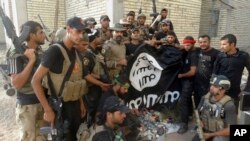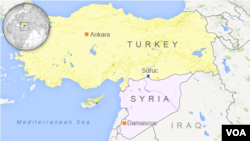While Turkey has joined in a campaign of airstrikes against Islamic State militants, a move welcomed by the White House, its prime minister maintains the country will not send foot soldiers into neighboring Syria.
"We will not send ground forces," Prime Minister Ahmet Davutoglu said during a meeting Monday with Turkish newspaper editors, according to the English-language Hurriyet Daily News.
Turkey began pummeling Islamic State targets Friday, as part of a two-pronged attack air offensive against IS militants in Syria and Kurdish rebels in Iraq.
Davutoglu told the editors the measures were intended to provide "air cover for the Free Syrian Army and other moderate elements" fighting the Islamic State group and the Kurdish Workers’ Party (PKK).
Turkey also last week announced it would allow a U.S.-led coalition to use its Incirlik Air Base for conducting airstrikes. It’s roughly 250 miles from the Syrian city of Raqqa.
Reports YPG was mistakenly attacked
Meanwhile, Turkey is investigating claims that its military struck positions in Syria other than those of Islamic State insurgents, a government official said on Monday, after the Kurdish YPG militia said it had come under attack.
"The ongoing military operation seeks to neutralize imminent threats to Turkey's national security and continues to target Islamic State in Syria and the PKK in Iraq," the official said. "The PYD (the political wing of the YPG), along with others, remains outside the scope of the current military effort."
On Sunday, the coalition carried out more than 30 airstrikes against IS targets in both Syria and Iraq, the Pentagon reported.
Ben Rhodes, U.S. deputy national security adviser, said Sunday that the White House appreciated Turkey’s "increased focus and accelerated efforts" against the Islamic State group in northern Syria and Iraq and that the United States shares Ankara's view that the PKK is a terrorist organization.
Rhodes, traveling with President Barack Obama in Africa, said Turkey has a right to take action against terrorist targets. He added that regional partners should work together to degrade IS safe havens.
"We encourage our different partners in this fight to work together," said Rhodes, who also said the U.S. has "a good working relationship with the regional Kurdish government in northern Iraq."
Turkey’s actions can lead toward a broader and more effective effort to degrade IS safe havens, Rhodes said.
Response to Suruc attacks
Washington said Turkey’s intervention is the product of continuous discussions. It also follows last week’s attack on the Turkish border town of Suruc that killed 32 people and separate attacks that killed Turkish security force members.
Turkey has blamed the PKK for recent fighting that left three Turkish security force members dead and included the abductions of Turkish citizens and public officials. Ankara’s airstrikes against the PKK, which has fought a violent insurgency for an autonomous homeland since the 1980s, threatens a fragile three-year cease-fire with the group.
The PKK has indicated the truce is effectively over.
Memebers of Turkey's parliament are expected to meet Wednesday for an extraordinary session, Hurriyet has reported.
Brett McGurk, deputy special presidential envoy for the global coalition to counter the IS group, tweeted on Sunday that there is no connection between Turkish airstrikes against the PKK "and recent understandings to intensify U.S.-Turkey cooperation against ISIL."
However, Stephen Zunes, who directs the University of San Francisco' Middle Eastern studies program, said the Turkish attacks complicate the fight against the IS group.
"The PKK and their close allies, the Syrian-based PYG (YPG), had been among the most effective fighters against ISIS," Zunes said. "... You have U.S.-armed Turks bombing Kurdish forces which have allied with the U.S. in attacks against ISIS, and it is yet another complication in this terrible mess developing in that part of the world."
He and James Jeffries, who works for the Washington Institute on Near East Policy and is a former U.S. ambassador to Iraq, believe this also has to do with domestic Turkish politics. Jeffries said President Recep Tayyip Erdogan could be using the Turkish policy change to shore up support for his ruling Justice and Development Party (AKP), which failed to win a parliamentary majority in June elections.
Jeffries suggested Erdogan is "probably hoping for a new election in a couple of months ... and the polls indicate he’s got a change of winning a majority, if a paper-thin one.... So, he’s trying to create a situation of emergency to do this."
Jeffries also said that while he doesn’t expect a major Turkish military action, the combination of Turkish airstrikes, coalition access to Incirlik, and tighter border controls to slow the flow of IS recruits, money and weapons across the Syrian frontier could prove to be effective.
Some material for this report came from Reuters





